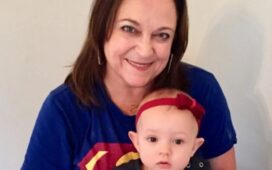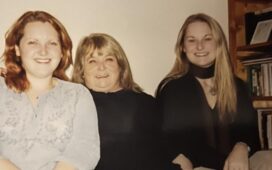If life had panned out the way we imagined, Chris and I would be doting grandparents by now. People who are childless not by choice know that as much as having children changes you, so does not being able to have children when you want them.
With five pregnancy losses, the last one 26 years ago, that is us.
With the benefit of hindsight, I can now see how having this choice taken away dramatically changed us. It is really obvious to me that we both exhibited the classic signs of trauma and depression during our miscarriages and for many years after.
We were both sad, empty, angry at times, lost, anxious and feeling as though there was nothing to look forward to. We compared ourselves to our friends who we thought were all living very happy, successful lives because they were having children easily (in many cases, this wasn’t actually true).
There were times when we were just going through the motions: we had stressful jobs that we were committed to that added to our cortisol overloads but we were essentially just getting out the front door each day. Out of work hours we filled the time with lots of activities to release the foofer valve – many lubricated with alcohol.
We were doing things that were fun but we felt we weren’t building anything or planning for the future in any way.
I can now see why. When you have kids you have to put down an anchor to some degree. You are forced to make decisions that centre around stability and a home base. You need to find childcare, kindergartens, schools and connect with your community in a way you don’t have to without kids. You have humans that literally depend on you for their survival.
We felt we did not have that anchor. Sometimes we were flapping in the breeze, feeling as though we had no agency in important areas of our lives and our decisions (or lack thereof) reflected this belief even when there was evidence to the contrary.
Trauma is experienced from the first miscarriage and is compounded by each one that follows; it can reinforce your belief you are jinxed or good things won’t ever happen.
You are so vulnerable and feel as though you are living in a strange bubble that no one else can see. Many people describe similar feelings when they lose a partner, parent or a child: the feeling of disbelief that you are so consumed by pain and the rest of the world is just getting on with their day oblivious to your devastation.
After my fifth and final miscarriage I eventually sought counselling from a free service attached to the hospital. The volunteer peer support counsellor was empathetic but near the end of my only session she handed me five blank birth certificate templates and suggested I take them home and with my husband go through each one and name each lost pregnancy. This exercise, she assured me, would help with our grief and show I had indeed given birth to five children. That I was a mother. It actually made me feel the opposite; it reinforced my belief that I had failed as a mother.
Walking out of hospital I felt completely bereft, alone and invisible. I ripped up the certificates and threw them into a street bin, sobbing. I never told Chris about the birth certificates; he just heard about them after reading this article.
Today, in our 60s, most of the time we now look through life with a somewhat softened lens. We want to share with others, decades down the track, that it can be hard at times but you can cobble a different life together. We know that being together after more than 30 years is a great achievement and we appreciate each other more and more. Nowadays we try not to focus so much on what we have lost but reflect on the fact we are still here and still together.
We have built a life full of people and activities we love and enjoy; we hang out with and feed friends, we love music, eating out, reading, writing, local and global news, going to art events of all kinds, watching sport and movies and being part of a neighbourhood that really gets us. We love mentoring younger people and also learning from them.
We meditate using free online resources and walk as much as we can for physical and mental health.
And our life is full of children.
Having oversized and obvious maternal and paternal urges can have its benefits. We have adorable, now adult, godchildren who we sublimated all our love into from birth and luckily received it back tenfold. We have nieces and nephews and have become aunties and uncles for children of colleagues and friends who embraced our love of their children and our need to spend time with them.
We still are that couple who impulsively interacts with unknown babies in the supermarket, on trams, in the street. Most times the babies and parents welcome our gushing and coos.
This life stage does reignite feelings of emptiness as we witness the joy of the grandchildren of others. At times we fear a future without – here it is again – the anchor of family; both limbs of our family trees end with us; what happens if we both get sick; where can we find purpose … on and on the voices of fear shrill.
Time can go some way to healing the crushing sadness of feeling like you are living a life of “compromise”.
A blown-up heart can never completely repair but regular love bombs from godchildren, friends and their children and grandchildren can be pretty great defibrillators.
In Australia, support is available at Beyond Blue on 1300 22 4636, Lifeline on 13 11 14, and at MensLine on 1300 789 978. In the UK, the charity Mind is available on 0300 123 3393 and Childline on 0800 1111. In the US, call or text Mental Health America at 988 or chat 988lifeline.org.













